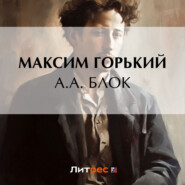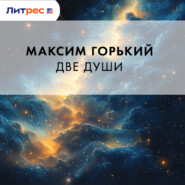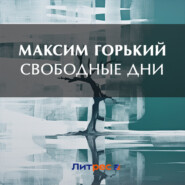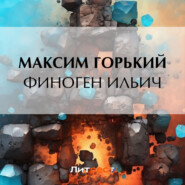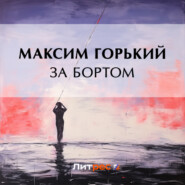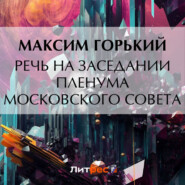По всем вопросам обращайтесь на: info@litportal.ru
(©) 2003-2025.
✖
Mother
Настройки чтения
Размер шрифта
Высота строк
Поля
"From where do they get it?" exclaimed the mother, thoroughly aroused. "From us, from the people – they get everything from us."
"Ye-es," drawled the peasant. "It's a wheel." He bent his head toward the door, listening attentively. "They're coming," he said softly.
"Who?"
"Our people, I suppose."
His wife entered. A freckled peasant, stooping, strode into the hut after her. He threw his cap into a corner, and quickly went up to their host.
"Well?"
The host nodded in confirmation.
"Stepan," said the wife, standing at the oven, "maybe our guest wants to eat something."
"No, thank you, my dear."
The freckled peasant moved toward the mother and said quietly, in a broken voice:
"Now, then, permit me to introduce myself to you. My name is Pyotr Yegorov Ryabinin, nicknamed Shilo – the Awl. I understand something about your affairs. I can read and write. I'm no fool, so to speak." He grasped the hand the mother extended to him, and wringing it, turned to the master of the house.
"There, Stepan, see, Varvara Nikolayevna is a good lady, true. But in regard to all this, she says it is nonsense, nothing but dreams. Boys and different students, she says, muddle the people's mind with absurdities. However, you saw just now a sober, steady man, as he ought to be, a peasant, arrested. Now, here is she, an elderly woman, and as to be seen, not of blue blood. Don't be offended – what's your station in life?"
He spoke quickly and distinctly, without taking breath. His little beard shook nervously, and his dark eyes, which he screwed up, rapidly scanned the mother's face and figure. Ragged, crumpled, his hair disheveled, he seemed just to have come from a fight, in which he had vanquished his opponent, and still to be flushed with the joy of victory. He pleased the mother with his sprightliness and his simple talk, which at once went straight to the point. She gave him a kind look as she answered his question. He once more shook her hand vigorously, and laughed softly.
"You see, Stepan, it's a clean business, an excellent business. I told you so. This is the way it is: the people, so to speak, are beginning to take things into their own hands. And as to the lady – she won't tell you the truth; it's harmful to her. I respect her, I must say; she's a good person, and wishes us well – well, a little bit, and provided it won't harm her any. But the people want to go straight, and they fear no loss and no harm – you see? – all life is harmful to them; they have no place to turn to; they have nothing all around except 'Stop!' which is shouted at them from all sides."
"I see," said Stepan, nodding and immediately adding: "She's uneasy about her baggage."
Pyotr gave the mother a shrewd wink, and again reassured her:
"Don't be uneasy; it's all right. Everything will be all right, mother. Your valise is in my house. Just now when he told me about you – that you also participate in this work and that you know that man – I said to him: 'Take care, Stepan! In such a serious business you must keep your mouth shut.' Well, and you, too, mother, seem to have scented us when we stood near you. The faces of honest people can be told at once. Not many of them walk the streets, to speak frankly. Your valise is in my house." He sat down alongside of her and looked entreatingly into her eyes. "If you wish to empty it we'll help you, with pleasure. We need books."
"She wants to give us everything," remarked Stepan.
"First rate, mother! We'll find a place for all of it." He jumped to his feet, burst into a laugh, and quickly pacing up and down the room said contentedly: "The matter is perfectly simple: in one place it snaps, and in another it is tied up. Very well! And the newspaper, mother, is a good one, and does its work – it peels the people's eyes open; it's unpleasant to the masters. I do carpentry work for a lady about five miles from here – a good woman, I must admit. She gives me various books, sometimes very simple books. I read them over – I might as well fall asleep. In general we're thankful to her. But I showed her one book and a number of a newspaper; she was somewhat offended. 'Drop it, Pyotr!' she said. 'Yes, this,' she says, 'is the work of senseless youngsters; from such a business your troubles can only increase; prison and Siberia for this,' she says."
He grew abruptly silent, reflected for a moment, and asked: "Tell me, mother, this man – is he a relative of yours?"
"A stranger."
Pyotr threw his head back and laughed noiselessly, very well satisfied with something. To the mother, however, it seemed the very next instant that, in reference to Rybin, the word "stranger" was not in place; it jarred upon her.
"I'm not a relative of his; but I've known him for a long time, and I look up to him as to an elder brother."
She was pained and displeased not to find the word she wanted, and she could not suppress a quiet groan. A sad stillness pervaded the hut. Pyotr leaned his head upon one shoulder; his little beard, narrow and sharp, stuck out comically on one side, and gave his shadow swinging on the wall the appearance of a man sticking out his tongue teasingly. Stepan sat with his elbows on the table, and beat a tattoo on the boards. His wife stood at the oven without stirring; the mother felt her look riveted upon herself and often glanced at the woman's face – oval, swarthy, with a straight nose, and a chin cut off short; her dark and thick eyebrows joined sternly, her eyelids drooped, and from under them her greenish eyes shone sharply and intently.
"A friend, that is to say," said Pyotr quietly. "He has character, indeed he has; he esteems himself highly, as he ought to; he has put a high price on himself, as he ought to. There's a man, Tatyana! You say – "
"Is he married?" Tatyana interposed, and compressed the thin lips of her small mouth.
"He's a widower," answered the mother sadly.
"That's why he's so brave," remarked Tatyana. Her utterance was low and difficult. "A married man like him wouldn't go – he'd be afraid."
"And I? I'm married and everything, and yet – " exclaimed Pyotr.
"Enough!" she said without looking at him and twisting her lips. "Well, what are you? You only talk a whole lot, and on rare occasions you read a book. It doesn't do people much good for you and Stepan to whisper to each other on the corners."
"Why, sister, many people hear me," quietly retorted the peasant, offended. "I act as a sort of yeast here. It isn't fair in you to speak that way."
Stepan looked at his wife silently and again drooped his head.
"And why should a peasant marry?" asked Tatyana. "He needs a worker, they say. What work?"
"You haven't enough? You want more?" Stepan interjected dully.
"But what sense is there in the work we do? We go half-hungry from day to day anyhow. Children are born; there's no time to look after them on account of the work that doesn't give us bread." She walked up to the mother, sat down next to her, and spoke on stubbornly, no plaint nor mourning in her voice. "I had two children; one, when he was two years old, was boiled to death in hot water; the other was born dead – from this thrice-accursed work. Such a happy life! I say a peasant has no business to marry. He only binds his hands. If he were free he would work up to a system of life needed by everybody. He would come out directly and openly for the truth. Am I right, mother?"
"You are. You're right, my dear. Otherwise we can't conquer life."
"Have you a husband?"
"He died. I have a son."
"And where is he? Does he live with you?"
"He's in prison." The mother suddenly felt a calm pride in these words, usually painful to her. "This is the second time – all because he came to understand God's truth and sowed it openly without sparing himself. He's a young man, handsome, intelligent; he planned a newspaper, and gave Mikhaïl Ivanovich a start on his way, although he's only half of Mikhaïl's age. Now they're going to try my son for all this, and sentence him; and he'll escape from Siberia and continue with his work."
Her pride waxed as she spoke. It created the image of a hero, and demanded expression in words. The mother needed an offset – something fine and bright – to balance the gloomy incident she had witnessed that day, with its senseless horror and shameless cruelty. Instinctively yielding to this demand of a healthy soul, she reached out for everything she had seen that was pure and shining and heaped it into one dazzling, cleansing fire.
"Many such people have already been born, more and more are being born, and they will all stand up for the freedom of the people, for the truth, to the very end of their lives."
She forgot precaution, and although she did not mention names, she told everything known to her of the secret work for the emancipation of the people from the chains of greed. In depicting the personalities she put all her force into her words, all the abundance of love awakened in her so late by her rousing experiences. And she herself became warmly enamored of the images rising up in her memory, illumined and beautified by her feeling.
"The common cause advances throughout the world in all the cities. There's no measuring the power of the good people. It keeps growing and growing, and it will grow until the hour of our victory, until the resurrection of truth."
Her voice flowed on evenly, the words came to her readily, and she quickly strung them, like bright, varicolored beads, on strong threads of her desire to cleanse her heart of the blood and filth of that day. She saw that the three people were as if rooted to the spot where her speech found them, and that they looked at her without stirring. She heard the intermittent breathing of the woman sitting by her side, and all this magnified the power of her faith in what she said, and in what she promised these people.
"All those who have a hard life, whom want and injustice crush – it's the rich and the servitors of the rich who have overpowered them. The whole people ought to go out to meet those who perish in the dungeons for them, and endure mortal torture. Without gain to themselves they show where the road to happiness for all people lies. They frankly admit it is a hard road, and they force no one to follow them. But once you take your position by their side you will never leave them. You will see it is the true, the right road. With such persons the people may travel. Such persons will not be reconciled to small achievements; they will not stop until they will vanquish all deceit, all evil and greed. They will not fold their hands until the people are welded into one soul, until the people will say in one voice: 'I am the ruler, and I myself will make the laws equal for all.'"
She ceased from exhaustion, and looked about. Her words would not be wasted here, she felt assured. The silence lasted for a minute, while the peasants regarded her as if expecting more. Pyotr stood in the middle of the hut, his hands clasped behind his back, his eyes screwed up, a smile quivering on his freckled face. Stepan was leaning one hand on the table; with his neck and entire body forward, he seemed still to be listening. A shadow on his face gave it more finish. His wife, sitting beside the mother, bent over, her elbows on her knees, and studied her feet.
"That's how it is," whispered Pyotr, and carefully sat on the bench, shaking his head.
Stepan slowly straightened himself, looked at his wife, and threw his hands in the air, as if grasping for something.
"If a man takes up this work," he began thoughtfully in a moderated voice, "then his entire soul is needed."
"Ye-es," drawled the peasant. "It's a wheel." He bent his head toward the door, listening attentively. "They're coming," he said softly.
"Who?"
"Our people, I suppose."
His wife entered. A freckled peasant, stooping, strode into the hut after her. He threw his cap into a corner, and quickly went up to their host.
"Well?"
The host nodded in confirmation.
"Stepan," said the wife, standing at the oven, "maybe our guest wants to eat something."
"No, thank you, my dear."
The freckled peasant moved toward the mother and said quietly, in a broken voice:
"Now, then, permit me to introduce myself to you. My name is Pyotr Yegorov Ryabinin, nicknamed Shilo – the Awl. I understand something about your affairs. I can read and write. I'm no fool, so to speak." He grasped the hand the mother extended to him, and wringing it, turned to the master of the house.
"There, Stepan, see, Varvara Nikolayevna is a good lady, true. But in regard to all this, she says it is nonsense, nothing but dreams. Boys and different students, she says, muddle the people's mind with absurdities. However, you saw just now a sober, steady man, as he ought to be, a peasant, arrested. Now, here is she, an elderly woman, and as to be seen, not of blue blood. Don't be offended – what's your station in life?"
He spoke quickly and distinctly, without taking breath. His little beard shook nervously, and his dark eyes, which he screwed up, rapidly scanned the mother's face and figure. Ragged, crumpled, his hair disheveled, he seemed just to have come from a fight, in which he had vanquished his opponent, and still to be flushed with the joy of victory. He pleased the mother with his sprightliness and his simple talk, which at once went straight to the point. She gave him a kind look as she answered his question. He once more shook her hand vigorously, and laughed softly.
"You see, Stepan, it's a clean business, an excellent business. I told you so. This is the way it is: the people, so to speak, are beginning to take things into their own hands. And as to the lady – she won't tell you the truth; it's harmful to her. I respect her, I must say; she's a good person, and wishes us well – well, a little bit, and provided it won't harm her any. But the people want to go straight, and they fear no loss and no harm – you see? – all life is harmful to them; they have no place to turn to; they have nothing all around except 'Stop!' which is shouted at them from all sides."
"I see," said Stepan, nodding and immediately adding: "She's uneasy about her baggage."
Pyotr gave the mother a shrewd wink, and again reassured her:
"Don't be uneasy; it's all right. Everything will be all right, mother. Your valise is in my house. Just now when he told me about you – that you also participate in this work and that you know that man – I said to him: 'Take care, Stepan! In such a serious business you must keep your mouth shut.' Well, and you, too, mother, seem to have scented us when we stood near you. The faces of honest people can be told at once. Not many of them walk the streets, to speak frankly. Your valise is in my house." He sat down alongside of her and looked entreatingly into her eyes. "If you wish to empty it we'll help you, with pleasure. We need books."
"She wants to give us everything," remarked Stepan.
"First rate, mother! We'll find a place for all of it." He jumped to his feet, burst into a laugh, and quickly pacing up and down the room said contentedly: "The matter is perfectly simple: in one place it snaps, and in another it is tied up. Very well! And the newspaper, mother, is a good one, and does its work – it peels the people's eyes open; it's unpleasant to the masters. I do carpentry work for a lady about five miles from here – a good woman, I must admit. She gives me various books, sometimes very simple books. I read them over – I might as well fall asleep. In general we're thankful to her. But I showed her one book and a number of a newspaper; she was somewhat offended. 'Drop it, Pyotr!' she said. 'Yes, this,' she says, 'is the work of senseless youngsters; from such a business your troubles can only increase; prison and Siberia for this,' she says."
He grew abruptly silent, reflected for a moment, and asked: "Tell me, mother, this man – is he a relative of yours?"
"A stranger."
Pyotr threw his head back and laughed noiselessly, very well satisfied with something. To the mother, however, it seemed the very next instant that, in reference to Rybin, the word "stranger" was not in place; it jarred upon her.
"I'm not a relative of his; but I've known him for a long time, and I look up to him as to an elder brother."
She was pained and displeased not to find the word she wanted, and she could not suppress a quiet groan. A sad stillness pervaded the hut. Pyotr leaned his head upon one shoulder; his little beard, narrow and sharp, stuck out comically on one side, and gave his shadow swinging on the wall the appearance of a man sticking out his tongue teasingly. Stepan sat with his elbows on the table, and beat a tattoo on the boards. His wife stood at the oven without stirring; the mother felt her look riveted upon herself and often glanced at the woman's face – oval, swarthy, with a straight nose, and a chin cut off short; her dark and thick eyebrows joined sternly, her eyelids drooped, and from under them her greenish eyes shone sharply and intently.
"A friend, that is to say," said Pyotr quietly. "He has character, indeed he has; he esteems himself highly, as he ought to; he has put a high price on himself, as he ought to. There's a man, Tatyana! You say – "
"Is he married?" Tatyana interposed, and compressed the thin lips of her small mouth.
"He's a widower," answered the mother sadly.
"That's why he's so brave," remarked Tatyana. Her utterance was low and difficult. "A married man like him wouldn't go – he'd be afraid."
"And I? I'm married and everything, and yet – " exclaimed Pyotr.
"Enough!" she said without looking at him and twisting her lips. "Well, what are you? You only talk a whole lot, and on rare occasions you read a book. It doesn't do people much good for you and Stepan to whisper to each other on the corners."
"Why, sister, many people hear me," quietly retorted the peasant, offended. "I act as a sort of yeast here. It isn't fair in you to speak that way."
Stepan looked at his wife silently and again drooped his head.
"And why should a peasant marry?" asked Tatyana. "He needs a worker, they say. What work?"
"You haven't enough? You want more?" Stepan interjected dully.
"But what sense is there in the work we do? We go half-hungry from day to day anyhow. Children are born; there's no time to look after them on account of the work that doesn't give us bread." She walked up to the mother, sat down next to her, and spoke on stubbornly, no plaint nor mourning in her voice. "I had two children; one, when he was two years old, was boiled to death in hot water; the other was born dead – from this thrice-accursed work. Such a happy life! I say a peasant has no business to marry. He only binds his hands. If he were free he would work up to a system of life needed by everybody. He would come out directly and openly for the truth. Am I right, mother?"
"You are. You're right, my dear. Otherwise we can't conquer life."
"Have you a husband?"
"He died. I have a son."
"And where is he? Does he live with you?"
"He's in prison." The mother suddenly felt a calm pride in these words, usually painful to her. "This is the second time – all because he came to understand God's truth and sowed it openly without sparing himself. He's a young man, handsome, intelligent; he planned a newspaper, and gave Mikhaïl Ivanovich a start on his way, although he's only half of Mikhaïl's age. Now they're going to try my son for all this, and sentence him; and he'll escape from Siberia and continue with his work."
Her pride waxed as she spoke. It created the image of a hero, and demanded expression in words. The mother needed an offset – something fine and bright – to balance the gloomy incident she had witnessed that day, with its senseless horror and shameless cruelty. Instinctively yielding to this demand of a healthy soul, she reached out for everything she had seen that was pure and shining and heaped it into one dazzling, cleansing fire.
"Many such people have already been born, more and more are being born, and they will all stand up for the freedom of the people, for the truth, to the very end of their lives."
She forgot precaution, and although she did not mention names, she told everything known to her of the secret work for the emancipation of the people from the chains of greed. In depicting the personalities she put all her force into her words, all the abundance of love awakened in her so late by her rousing experiences. And she herself became warmly enamored of the images rising up in her memory, illumined and beautified by her feeling.
"The common cause advances throughout the world in all the cities. There's no measuring the power of the good people. It keeps growing and growing, and it will grow until the hour of our victory, until the resurrection of truth."
Her voice flowed on evenly, the words came to her readily, and she quickly strung them, like bright, varicolored beads, on strong threads of her desire to cleanse her heart of the blood and filth of that day. She saw that the three people were as if rooted to the spot where her speech found them, and that they looked at her without stirring. She heard the intermittent breathing of the woman sitting by her side, and all this magnified the power of her faith in what she said, and in what she promised these people.
"All those who have a hard life, whom want and injustice crush – it's the rich and the servitors of the rich who have overpowered them. The whole people ought to go out to meet those who perish in the dungeons for them, and endure mortal torture. Without gain to themselves they show where the road to happiness for all people lies. They frankly admit it is a hard road, and they force no one to follow them. But once you take your position by their side you will never leave them. You will see it is the true, the right road. With such persons the people may travel. Such persons will not be reconciled to small achievements; they will not stop until they will vanquish all deceit, all evil and greed. They will not fold their hands until the people are welded into one soul, until the people will say in one voice: 'I am the ruler, and I myself will make the laws equal for all.'"
She ceased from exhaustion, and looked about. Her words would not be wasted here, she felt assured. The silence lasted for a minute, while the peasants regarded her as if expecting more. Pyotr stood in the middle of the hut, his hands clasped behind his back, his eyes screwed up, a smile quivering on his freckled face. Stepan was leaning one hand on the table; with his neck and entire body forward, he seemed still to be listening. A shadow on his face gave it more finish. His wife, sitting beside the mother, bent over, her elbows on her knees, and studied her feet.
"That's how it is," whispered Pyotr, and carefully sat on the bench, shaking his head.
Stepan slowly straightened himself, looked at his wife, and threw his hands in the air, as if grasping for something.
"If a man takes up this work," he began thoughtfully in a moderated voice, "then his entire soul is needed."












